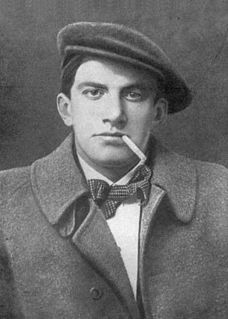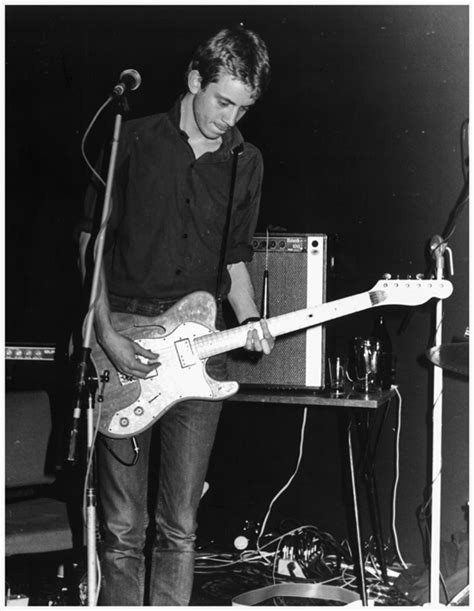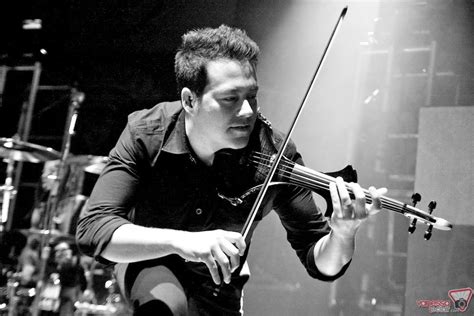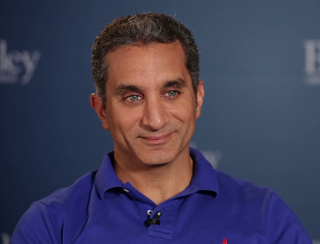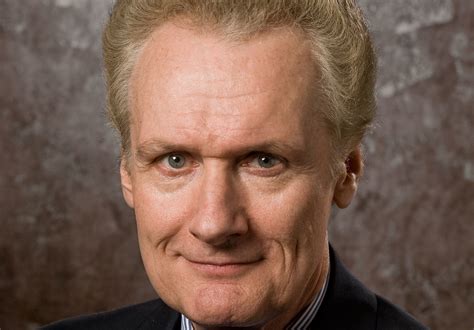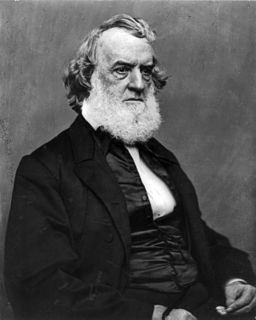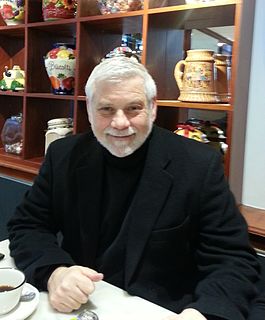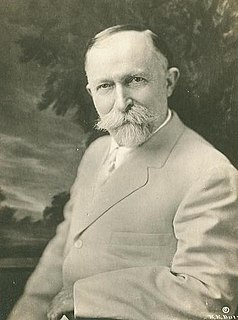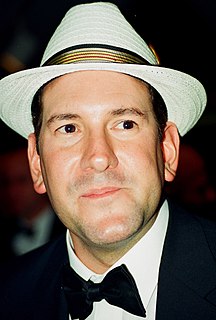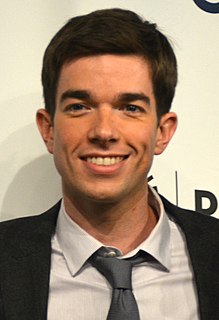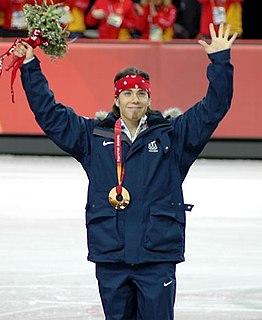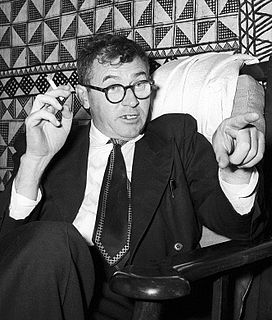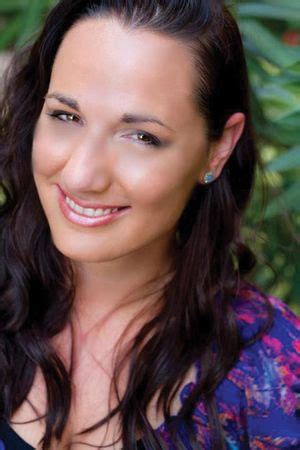Top 655 Madison Avenue Quotes & Sayings - Page 11
Explore popular Madison Avenue quotes.
Last updated on November 24, 2024.
They stood brow to brow, brown to white, black to black, he supporting her elbows, she playing her limp light fingers over his collarbone, and how he "ladored,"he said, the dark aroma of her hair blending with crushed lily stalks, Turkish cigarettes and the lassitude that comes from "lass." "No, no, don't," she said, I must wash, quick-quick, Ada must wash; but for yet another immortal moment they stood embraced in the hushed avenue, enjoying as they had never enjoyed before, the "happy-forever" feeling at the end of never-ending fairy tales.
I wanted to go higher than Rockefeller Center, which was being erected across the street from Saks Fifth Avenue and was going to cut off my view of the sky. . . . Flying got into my soul instantly but the answer as to why must be found somewhere back in the mystic maze of my birth and childhood and the circumstances of my earlier life. Whatever I am is elemental and the beginnings of it all have their roots in Sawdust Road. I might have been born in a hovel, but I determined to travel with the wind and stars.
The main reason for the break was a combination of travel and going back to university, which drew me into theatre more than music. I did stuff on acoustic guitar when I was traveling, filed it away and made notes, without it being musical notation. Just taped the odd thing, did a sketch, stuck it on a cassette. I thought at some point, I'll go back to it. Some of it I did use in '84-'85 when I started working in the Free Theatre in Christchurch. So it might seem like I had given up after the Pin Group, but I just went into a different avenue.
Music feels like therapy, actually. A lot of people come out of a therapy session and feel like a weight has been lifted - I got it out, I cried, I feel good. I think for me this is just my way of doing that. It's the only avenue I have that fulfills that, that makes me feel good about myself. And I don't mean that in regards to the rewards, or like getting some good review. That's not what it's about. It's more about trying to please myself. It's really sick and weird.
In Harlem, for instance, all of the stores are owned by white people, all of the buildings are owned by white people. The black people are just there - paying rent, buying the groceries; but they don't own the stores, clothing stores, food stores, any kind of stores; don't even own the homes that they live in. They are all owned by outsiders, and for these run-down apartment dwellings, the black man in Harlem pays more money than the man down in the rich Park Avenue section.
I would describe our band "Paper Walls' growth as the natural evolution for anyone the age of 25 to 27, but with "Paper Walls' we focused on the best of what Yellowcard had to offer from our previous work. Meaning we took the energy we had from Ocean Avenue and blended that with that sharp rock edge and all the different sonic evolutions we have on "Lights and Sounds', and we basically mashed them together. So what we have on "Paper Walls' is basically the finest Yellowcard sounds we have to offer.
The theater itself is so archaic and old fashioned, that it doesn't really matter to me whether it's on Avenue D or at the Helen Hayes Theater. What's the difference? It's still a very nostalgic form. Also, it means you're knowingly walking into a room where there's actors. I feel it's very embarrassing. Because, you know, they're right there. You always think like, they can see you, and I think it's mortifying, frankly, and I hate to sit near the front, where you feel they actually might see you. It's too ... it's too live.
I want you to forget all your insecurities. I want you to reject anyone of anything that's ever made you feel like you don't belong or don't fit in or made you fell like you're not good enough or pretty enough or thin enough or can't sing well enough or dance well enough or write a song well enough or like you'll never win a Grammy or you'll never sell out Madison Square Garden, you just remember that you're a goddamn superstar and you were born this way!
White guilt is more of a sanctioned social convention than a genuine emotional experience. It’s a form of theatrical empathy that’s socially and financially rewarded. When you learn to say and perhaps even believe the right things about race, doors are opened for you. When you say the wrong thing, those doors slam shut. Then, the gossips and church ladies will shame you publicly, demand that you be fired from your job, and use every avenue available to them to coerce a confession, a public apology and a staged conversion that contributes to their progressive narrative.
The memories of those who perished in the Warsaw Uprising cry out across the decades, and few are clearer than the memories of those who died to build and defend the Jerusalem Avenue crossing. Those heroes remind us that the West was saved with the blood of patriots; that each generation must rise up and play their part in its defense - and that every foot of ground, and every last inch of civilization, is worth defending with your life.
Donald Trump is not stupid. He knows exactly what he's saying. And he's just saying out there - I mean, forget about Muslims. He said I could go down on Fifth Avenue in New York and shoot someone in the face and people - and the voters will have no problem with it. This transcends any kind of religion and any kind of belief. This is actually an offense and attack on human values. He's just saying out there I will shoot people in the face and people wouldn't care.
I've always thought it would be fun to update "Hansel and Gretel." I'd have these white parents in the suburbs with an income of fifty or sixty thousand dollars. Daddy loses his job, and the wicked stepmother says, "We could get along, we could keep our Mastercharge, if you'd just get rid of those shitty kids." Finally the father hires a limo and tells the driver, "Drop 'em off on Lenox Avenue in Harlem at two in the morning." These two little white kids land there. They're menaced. And this supposedly nice black lady says, "Would you like some candy?"
The people that say diversity is the reason for the greatness are purposely assaulting the United States as founded. They want you to believe that America was only great for a few people as founded, because, as founded, America was gigantically discriminating against the poor and against people of color and against transgenders. Yeah, I've read the Federalist Papers, you know. James Madison, he wasn't popular with the transgender group back then. Did you know that? You won't find the word. It was not a factor, the way they have attempted to modernize things here today. It's just lies.
Extemporaneous speaking should be practised [sic] and cultivated. It is the lawyer's avenue to the public. However able and faithful he may be in other respects, people are slow to bring him business if he cannot make a speech. And yet there is not a more fatal error to young lawyers than relying too much on speech-making. If any one, upon his rare powers of speaking, shall claim an exemption from the drudgery of the law, his case is a failure in advance.
Madison understood that if you want to protect rights from government abuse, you would be wise not to give government the power in the first place that can be used to abuse rights. That is a lesson we have forgotten. As we have asked government to do more and more for us, we have forgotten that a government big enough to give us everything we want will be powerful enough to take everything we have.
On the Avenue in front of the White House were several hundred colored people, mostly women and children, weeping and wailing their loss. This crowd did not diminish through the whole of that cold, wet day; they seemed not to know what was to by their fate since their great benefactor was dead, and though strong and brave men wept when I met them, the hopeless grief of those poor colored people affected me more than almost anything else.
Keeping a slow hunch alive poses challenges on multiple scales. For starters, you have to preserve the hunch in your own memory, in the dense network of your neurons. Most slow hunches pass in and out of our memory too quickly, precisely because they possess a certain murkiness. You get a feeling that there's an interesting avenue to explore, a problem that might lead you to a solution, but then you get distracted by more pressing matters and the hunch disappears. So part of the secret of hunch cultivation is simple: write everything down.
But we do need a breather. We do need knowledge. And perhaps in a thousand years we might pick smaller cliffs to jump off. The books are to remind us what asses and fools we are. They’re Caesar’s praetorian guard, whispering as the parade roars down the avenue, ‘Remember, Caesar, thou art mortal.’ Most of us can’t rush around, talk to everyone, know all the cities of the world, we haven’t time, money or that many friends. The things you’re looking for, Montag, are in the world, but the only way the average chap will ever see ninety-nine per cent of them is in a book.
Farrakhan got everybody together for the Million Man March and everything. But Farrakhan don't like the Jews. Which is bugged. I get my hair cut on Dekalb Avenue. I never been in a barbershop and heard a bunch of brothers talking about Jews. Black people don't hate Jews. Black people hate white people! We don't got time to dice white people up into little groups. I hate everybody! I don't care if you just got here. "Hey, I'm Romanian." "You Romanian cracker!"
One cannot walk down an avenue, converse with a friend, enter a building, browse beneath the sandstone arches of an old arcade without meeting an instrument of time. Time is visible in all places. Clock towers, wristwatches, church bells divide years into months, months into days, days into hours, hours into seconds, each increment of time marching after the other in perfect succession. And beyond any particular clock, a vast scaffold of time, stretching across the universe, lays down the law of time equally for all.
Fifty-thousand were gathered (March,27th,1933) in and around Madison Square Garden, supportive rallies were at that moment waiting in Chicago, Washington, San Francisco, Houston, and about seven other American cities. At each supportive rally, thousands huddled around loudspeakers waiting for the Garden event, which would be broadcast live via radio to 200 additional cities across the country. At least 1 million Jews were participating nationwide. Perhaps another million Americans of non-Jewish descent heritage stood with them.
The breakfast food idea made its appearance in a little third-story room on the corner of 28th Street and Third Avenue, New York City....My cooking facilities were very limited, making it very difficult to prepare cereals. It often occurred to me that it should be possible to purchase cereals at groceries already cooked and ready to eat, and I considered different ways in which this might be done.
I have a very clear perception what the Internet is in my mind. I'm free. I'm not defined by what they say is the Internet is. Meaning Goldman Sachs, meaning who they invest in for the latest start-up, meaning the latest Buzzfeed, or Salon, or Gawker. Well, Gawker's more independent. But, there's a lot of corporate makeover of the Internet that I have not adapted to, simply put. I'm friends with some of them. When I go to New York I make the 6th Avenue rounds, but I am not a part of that system.
Lesson number one in trying to develop the ability of independent thought: Understand that EVERYTHING the government says has the potential to be lies and deception. You can believe it's the truth only after you question, exhaust every avenue, and find that their story checks out. If you're a patriot, it's your duty to always question your government anyway, at every turn. A patriot is loyal to his country and his countrymen, not his government.
... superstitions, which, being unable to defend themselves on fair ground, raise these intangling brambles to cover and protect their weakness. Chased from the open country, these robbers fly into the forest, and lie in wait to break in upon every unguarded avenue of the mind, and overwhelm it with religious fears and prejudices. ... The idea of God, as meaning an infinitely intelligent, wise and good Being, arises from reflecting on the operations of our own mind, and augmenting, without limit, those qualities of goodness and wisdom.
I had relatives in New York City who I stayed with. And in those days, the area from Union Square down Fourth Avenue had small bookstores, many of which were run by Spanish immigrants who'd fled after [Francisco] Franco's victory. I spent time in them, and also in the offices of Freie Arbeiter Stimme (Free Worker's Voice) with anarchists. I picked up a lot of material and talked to people, and it became a major influence.
For me, digital is just another avenue. It doesn't mean that it has to be poor quality or poor content. But, you still run into the same struggles. You can't have full-on language, violence or sexual situations. You can't run rampant with the fact that it's digital. You can't do anything you want. You still have a responsibility to tell a story first, and show what the character is going through first, and then maybe you have a little bit of lee-way to show a more real side of life.
My grandfather and his wife came to America at the end of the 19th century from Hungary. Everyone started out on the Lower East Side. They became embourgeoise and would move to the Upper West Side. Then, if they'd make money, they'd move to Park Avenue. Their kids would become artists and move down to the Lower East Side and the Village.
I saw the days of the year stretching ahead like a series of bright, white boxes, and separating one box from another was sleep, like a black shade. Only for me, the long perspective of shades that set off one box from the next day had suddenly snapped up, and I could see day after day after day glaring ahead of me like a white, broad, infinitely desolate avenue.
I was new to acting on a stage in a narrative as opposed to acting on a stage as a stand-up. And like everything else it's just like comfort level. The first time I did stand-up I was at a place called the B3 in New York on Third and Avenue B and I not only didn't take the mic out of the stand, but I clutched the stand of the entire time.
If I... if I competed in Bruno Sammartino's era, I'd have been champion for 20 years, too. No, I'd have been champion for 30 years. Because wrestling one night a month at Madison Square Garden is easy. You never see a Hulk Hogan wrestle TLC matches against a superstar like Ryback. Because he had it easy. I wrestle physically demanding matches on free television, week in and week out. So much that my one year equals 30 of theirs. And I have attained this success, not... not because of you. I am successful not because of you. I am successful in spite of you.
Being accused of making money by selling sex in Hollywood, home of the casting couch and the gratuitous nude scene, is so rich with irony that it's a better subject for a comic novel than a column.... On one coast the cops are busting sex workers on Eighth Avenue, dragging them downtown to night court where they pay the fine and go right back to their corner; on another they're charging Heidi Fleiss with pandering in a town in which the verb is an art form.
The idea that the universe itself is physically structured around hierarchy was sort of an integration of earlier science and theology that was made by people like Thomas Aquinas, that was assumed doctrinally in that tradition. The Reformation rejected that model of reality and created a highly individualistic metaphysics in the sense that it located everything normative that can be said about reality in human perception, there being, of course, no other avenue of knowing. There is Scripture, there is conscience, there is perception itself.
In Moscow, dim and green under the summer rain, columns of armour were waiting in the side-roads off the long avenue from Vnukovo airport. Tanks from the Taman Division stood beneath the dripping trees around Moscow University with their field kitchens and command trucks. This was not a new sight to me: the Soviet tanks had rested like that beneath the trees of the parks in Prague, late in another August twenty-three years before. Now they had invaded and crushed one more country -- their own.
Early evening traffic was beginning to clog the avenue with cars. The sun slanted down behind him. Harry glanced at the drivers of the cars. They seemed unhappy. The world was unhappy. People were in the dark. People were terrified and disappointed. People were caught in traps. People were defensive and frantic. They felt as if their lives were being wasted. And they were right.
What, are you totally psycho?" I shouted. "Maybe I am!" he screamed back at me. "Maybe that's just what I am. Maybe I'm that quiet guy who suddenly goes nuts and then you find half the neighborhood in his freezer." I gotta admit, that one stumped me for a second - but only for a second. "Which half?" I asked. "Huh?" "Which half of the neighborhood? Could you make it the people on the other side of Avenue T, because I never really liked them anyway.
Long John would sometimes hold his interviews in the Carnegie Delicatessen, which is the most famous delicatessen in New York up by Carnegie. Let's see, 57th Street, you're down to like 50th Street and 7th Avenue... You'd go in there and everybody would be eating a heart attack on a plate, pastrami, malts, that kind of stuff. But it literally was the place where Woody Allen would go.
...quite simply, I was in love with New York. I do not mean “love” in any colloquial way, I mean that I was in love with the city, the way you love the first person who ever touches you and you never love anyone quite that way again. I remember walking across Sixty-second Street one twilight that first spring, or the second spring, they were all alike for a while. I was late to meet someone but I stopped at Lexington Avenue and bought a peach and stood on the corner eating it and knew that I had come out out of the West and reached the mirage.
My artistic goal was to write something that's one hundred percent real and true to me and to this world. I tried to touch on truths that really connect with people from every avenue of life. Ultimately, when you write from a vantage point of faith, humility and openness to the world around you, people have to respond because those same truths are instilled in them. Honestly, I don't have any agenda other than being sincere, real, and passionate about these songs and the music I make.
The first time I got a chance to meet Michael was onstage at Madison Square Garden. There were tons of people on the stage, and I just remember losing my mind. Like, Oh my God, that's Michael Jackson right there. I was just over his right shoulder. And then when I finally got a chance to get on the stage with him, I was just shut down. He had the type of magic that you just bowed to. I just said, "I love you, and I know you've heard it a million and one times from fans all over the world, but you've meant so much to me as an entertainer, and I love you, and I've admired you all these years.
I have a very, very great balance sheet, so great that when I did the Old Post Office on Pennsylvania Avenue, the United States government, because of my balance sheet, which they actually know very well, chose me to do the Old Post Office, between the White House and Congress, chose me to do the Old Post Office.
Dear Bill (O'Reilly)...I am concerned that you have been losing touch with reality recently. Did you really say you are more powerful than any politician? That reminds me of the famous story about Squeaky the Chicago Mouse. It seems that Squeaky was floating on his back along the Chicago River one day. Approaching the Michigan Avenue lift bridge, he called out: Raise the bridge! I have an erection!
The older I get, the more and more I notice I'm like my father. It's funny, because when I was younger I tried to just back away from my father as much as I could, and some of the philosophies, some of the life lessons, some of the beliefs that he had within me are always constantly ongoing, and they're always prevalent in my life, whether it's trying to be every single thing that I can be in my sport or life or relationship or business, whatever avenue I'm pursuing.
I graduated in June 1948 and then went in the fall to the art school. I stayed with my cousins on Seventeenth Street in the beginning, and later had my own apartment very near there and was able to walk to the Art Institute on Elmwood Avenue. The school had a faculty of local artists - Jeanette and Robert Blair, James Vullo who were well known in the area. It was a school that I think thrived on returning GIs, as many schools did at that time. It was a very informal program - but it was professional.
Individuals interested in donating can call The Bridge. We do still need food, paper products, money, cleaning supplies - if people could call and coordinate donations. People loved donating clothing to The Bridge - it was an avenue; if they could put their focus on collecting cleaning supplies - toilet paper, food etc. - these items are a priority.
I don't drink coffee I take tea my dear, I like my toast done on one side. And you can hear it in my accent when I talk, I'm an Englishman in New York. See me walking down Fifth Avenue, a walking cane here at my side. I take it everywhere I walk, I'm an Englishman in New York. I'm an alien I'm a legal alien, I'm an Englishman in New York.
Retailing has become fiercely competitive. Today there are many large global fashion companies who have opened up mono-brand stores in major cities around the world. When I first opened my boutique in New York, in 1985, there were almost no other European luxury brands present with their own stores. Now Fifth Avenue is packed with huge stores from major Italian and French labels.
In New Haven, Conn., when I was growing up, there were two sorts of Irish. There were the "drugstore cowboy" micks, who hung around the Elm Street poolroom over Longley's Lunch. And there were the earnest young Irishmen who fought their way up from the Grand Avenue saloonkeeper backgrounds of their fathers, went through Yale Law School, and have now found high place by the preferment of local politics or in the teaching profession.
I took care of my wheel as one would look after a Rolls Royce. If it needed repairs I always brought it to the same shop on Myrtle Avenue run by a negro named Ed Perry. He handled the bike with kid gloves, you might say. He would always see to it that neither front nor back wheel wobbled. Often he would do a job for me without pay, because, as he put it, he never saw a man so in love with his bike as I was.
Poverty is not an accident of, sort of, an economic spreadsheet. Poverty is a crime. There are criminals involved. And those criminals walk the streets as free men. What my music is about, and what - this from the riots in the streets of Greece and Spain to the people's uprisings in Egypt and Libya and Madison is about is holding those people accountable, those who are responsible for subverting the entire global economy and causing so much misery and then laughing about it with their, you know, clinking their champagne glasses on their yachts.
The essence of intercultural education is the acquisition of empathy-the ability to see the world as others see it, and to allow for the possibility that others may see something we have failed to see, or may see it more accurately. The simple purpose of the exchange program...is to erode the culturally rooted mistrust that sets nations against one another. The exchange program is not a panacea but an avenue of hope.
Outside it's a perfect spring night. We stand on the sidewalk in front of our apartment building, and Henry takes my hand, and I look at him, and I raise our joined hands and Henry twirls me around and soon we're dancing down Belle Plaine Avenue, no music but the sound of cars whoosing by and our own laughter, and the smell of cherry blossoms that fall like snow on the sidewalk as we dance underneath the tress.
When I hear what we call music, it seems to me that someone is talking. And talking about his feelings, or about his ideas of relationships. But when I hear traffic, the sound of traffic - here on Sixth Avenue, for instance - I don’t have the feeling that anyone is talking. I have the feeling that sound is acting. And I love the activity of sound... I don’t need sound to talk to me.
His lips hovered over hers. “No,” he snarled. Madison wasn’t sure to whom he was talking, but then his mouth was crushing hers, and her world became him—the touch and feel of his lips pressing down, forcing hers to respond. It wasn’t a gentle kiss or a sweet exploration. It was angry and raw, breathtaking and soul burning. Right now, she didn’t want gentle. She wanted hard and fast, him and her, on the floor, even the bear rug, both of them naked and sweating.
